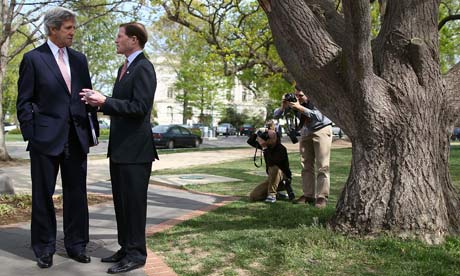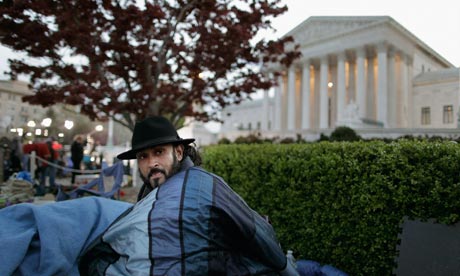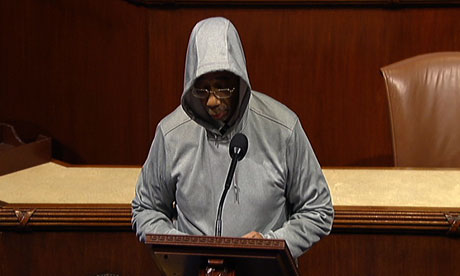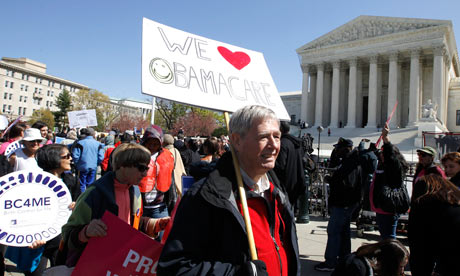Here's a sampling of more commentary as supreme court oral arguments on healthcare have wrapped up. What do the stars portend, experts? Pundits? Amateurs who may know something?
Former George W Bush speechwriter turned conservative pariah David Frum warns Republicans that they'll need to come up with a healthcare message -- a message that makes sense, we should say -- if the healthcare reform law is upheld:
Make no mistake: If Republicans lose in the supreme court, they'll need an answer. "Repeal" may excite a Republican primary electorate that doesn't need to worry about health insurance because it's overwhelmingly over 65 and happily enjoying its government-mandated and taxpayer-subsidized single-payer Medicare system. But the general-election electorate doesn't have the benefit of government medicine. It relies on the collapsing system of employer-directed care. It's frightened, and it wants answers.
Dan Diamond of The Advisory Board emphasizes the importance of the debate over the law's Medicaid expansion. If the Court strikes down or tampers with this aspect -- an unlikely scenario, most experts agree, but who knows! -- the legal precedent could be dramatic in how it redefines the federal-state relationship:
But the White House needs states to remain in the program for the ACA to reach its potential. The Medicaid expansion was designed to deliver on one of the law's core tenets: Expanding coverage. Roughly half of the 31 million Americans expected to gain health insurance under the ACA--about 16 million--would get it through the Medicaid program.
The case also has huge legal significance, although it's drawn less attention than the debate over the mandate. As Robert Pear writes in the New York Times, the states' case has "implications that go far beyond healthcare ... [affecting] federal grants to the states for other purposes, like education [and] transportation."
And TNR's Jonathan Cohn gives credit to Solicitor General Donald Verrilli, who (partially) made up for his lackluster performance yesterday with an excellent closing statement this afternoon:
Again, I'm not making any guesses on what these questions to suggest, about what the justices are thinking or how they'll eventually rule -- except to say that, generally, the government's case seemed to have more support than it did in the last two hearings.
Verrelli closed his remarks with a soliloquy, tying together discussion of both the Medicaid expansion and (on Tuesday) the minimum coverage requirement. After acknowledging that the case was about liberty, he told the court that access to life-sustaining healthcare and freedom from crushing are also forms of liberty.
It was his best moment in the entire three days of hearings: He pointed out the consequences of repealing part while reminding the justices that judgments about good policy, the kind the justices made frequently during oral arguments, are best left to Congress.
Are you all tired of these cutesy jokes about Mitt Romney's wealth, or do you still find them funny? I don't even know anymore. Anyway: "Rich Counts."
Our correspondent Chris McGreal, who watched the morning session, has the full report here on, among other things, what the pivotal Justice Kennedy might be thinking:

The position of Justice Anthony Kennedy was closely watched because he is considered a key swing vote both on the question of the constitutionality of the insurance requirement and whether to strike down the whole law.
On Tuesday, Kennedy appeared to tilt toward the argument that compulsory insurance is unconstitutional because it greatly expands the powers of the government by, for the first time, obliging Americans to buy a product.
The tone of Kennedy's questioning on Wednesday indicated that he has already determined that mandatory insurance is illegal. He then suggested that because removing the insurance requirement fundamentally changes the health reform legislation into something that Congress did not envisage, the court would be acting with restraint if it struck down the entire legislation.
Here's a sunny new poll this afternoon for the Obama administration, giving him a double-digit lead in hypothetical general election matchups:
Do note that there are 7-8 more months until election day and these numbers will bounce around another eight or nine hundred times.
And the last transcript (PDF) and audio, from this afternoon's session, is up on the supreme court's website. Tomorrow you will all be forced to take a quiz. (No, you won't) (Maybe???).
More Scalia oddness: he invoked The Godfather to argue that the expansion of Medicaid (technically an opt-out program) could be unfairly coercive to the states:
Dave Weigel at Slate asks a question that, sadly, must be taken seriously: does Justice Scalia know what's in the PPACA? Or is he just working from the angry right-wing blog posts he read in December 2009?
"If we struck down nothing in this legislation but the – what's it called, the Cornhusker kickback, okay, we find that to violate the constitutional proscription of venality, okay?" asked Scalia, talking to Paul Clement. "When we strike that down, it's clear that Congress would not have passed it without that. It was the means of getting the last necessary vote in the Senate. And you are telling us that the whole statute would fall because the Cornhusker kickback is bad. That can't be right."
The "Cornhusker Kickback," a term coined by Senate Minority Leader Mitch McConnell, was a provision added to the Senate healthcare bill that Democrats passed on Christmas Eve, 2009, in order to secure Nebraska Sen. Ben Nelson's vote. The carve-out would have led the federal government to pick up 100% of the tab for new Medicaid enrollees permanently for Nebraska only. It's true that that helped Democrats overcome a filibuster and pass the bill by a 60-39 margin.
But the "Cornhusker Kickback" was then taken out of the bill in a later iteration, because it was such an embarrassing, transparent instance of cynical congressional horsetrading that the entire country was disgusted. It's not in the law, as he seems to think.
Aww, now it's time for hugs:
And the second session of the day has adjourned – the Most Important Legal Proceeding Since The Trial Of Jesus Christ is over! Let's see if worrywart Jeffrey Toobin escaped before his head exploded:
Toobin will survive. Again: Toobin will survive. The healthcare reform law though? We'll have to wait a couple of months before we know about that.
Another thing to keep in mind about the "severability" of the individual mandate: legislators didn't (forgot to?) include a "severability clause" in the healthcare law, which would have prevented the court from throwing out the whole bill if it found one provision – such as, say, an individual mandate – unconstitutional. That doesn't mean it is obligated to throw out the whole bill if there's one one provision it finds unconstitutional, and doing so would be a radical act. But if the whole thing was tossed, Democratic lawmakers would deserve part of the blame for their carelessness.
 Democratic senator John Kerry talks with senator Richard Blumenthal before a news conference concerning the constitutionality of the healthcare law. Photograph: Mark Wilson/Getty Images
Democratic senator John Kerry talks with senator Richard Blumenthal before a news conference concerning the constitutionality of the healthcare law. Photograph: Mark Wilson/Getty Images
In the afternoon session, Paul Clement tried to argue that the provision for states to expand their Medicaid programs, a part of the bill expected to bring coverage for 15 million low-income Americans and children, unfairly coerces the states. The way the program would work: The federal government would pick up the states' full tab for new enrollees through 2014, after which it would pick up a mere 90%.
This "coercion" claim is expected to be Clement's most challenging argument, and as the Wall Street Journal liveblog notes, liberal justices were all over him as this afternoon's session began. Stephen Breyer, for example:
Justice Stephen Breyer, meanwhile, has been hitting Mr. Clement hard on his most central claim: that the federal government will force states to leave the Medicaid program entirely if they don't go along with the expansion under the health law. States say that they are afraid that this will destroy their budgets, which rely heavily on Medicaid funds.
Justice Breyer says that that isn't the case -- it's up to the Health and Human Services Secretary to decide whether to kick them out altogether, and administrative law requires the secretary and other federal government officials to act reasonably, he argues. "Now, does that relieve you of your fear?" he asked.
Meanwhile, on the campaign trail, Rick Santorum just wants to be left alone with his lunch.
The court's audio and transcript (PDF) from this morning's session are online.
Our correspondent Chris McGreal lined up at 4am to be sure of a seat in court today. Here's his take:
Wednesday morning's session boiled down to dueling between the court's liberal and conservative justices over who should have the authority to decide the fate of the rest of the healthcare legislation if its core, mandatory medical insurance, is ruled unconstitutional. Justice Scalia was the most aggressive in pressing the idea that it is not up to the supreme court to wade through the remainder of the legislation to decide what should remain and what should not.He appeared firmly in favour of striking down the whole law if the individual mandate is declared unconstitutional – and gave a clear sign that he thinks it is when he argued that it would be better to throw out the whole law and let Congress begin again.
"Whether we strike it all down or leave some of it in place, the congressional process will never be the same. One way or another, Congress is going to have to reconsider this, and why isn't it better to have them reconsider it – what – what should I say – in toto, rather than having some things already in the law which you have to eliminate before you can move on to consider everything on balance?" he said.
Some of the more liberal judges were open to the idea that it need not be the end of the health reform law. Justice Sotomayor suggested that if the individual mandate is ruled out, the rest could he allowed to stand while Congress amends the legislation to make it workable.
Justice Kagan said the legislation did not have to be perfect for it to be viable. She said the law was in any case a compromise reached in Congress. "And the question is always, does Congress want half a loaf. Is half a loaf better than no loaf?" she said.
Justice Breyer argued that there are many aspects of the legislation not directly related to the individual mandate. "I would say the Breast Feeding Act, the getting doctors to serve underserved areas, the biosimilar thing and drug regulation... those have nothing to do with the stuff that we've been talking about yesterday and the day before, okay? So if you ask me at that level, I would say, sure, they have nothing to do with it, they could stand on their own," he said.
So the takes following this morning's session don't seem as gloomy for the law's prospects as yesterday, but it was still hardly a walk in the park for the government's lawyers. The four liberal justices seem intent on preserving the law even without an individual mandate – although, as we gleaned yesterday, they're also intent on preserving the individual mandate. Justice Scalia, meanwhile, sounds eager to destroy the entire law with a sledgehammer as soon as possible, for various constitutional and political and congressional procedure-based reasons (whatever works, basically.) Justices Roberts and Kennedy simply would like to ask more questions, and perhaps play devil's advocate on occasion, to mess with our heads.
The key issue is to what degree removing the individual mandate would disrupt interlocking parts of the bill. Scalia best exemplified the absolutist's take: "My approach would be to say that if you take the heart out of this statute, the statute's gone." This neatly echoed the argument of the plaintiff's lawyer, Paul Clement, who put it, "If the individual mandate is unconstitutional, then the rest of the act cannot stand."
Perhaps there's a bit of nuance the absolutists overlook, however? The individual mandate may be the heart of the health insurance finance mechanism in the law – if you require insurers to offer coverage to applicants with pre-existing conditions, then you need a lever for universality that keeps healthier folks in the risk pool to prevent the so-called health insurance "death spiral", while offering generous government subsidies to further induce them into participation. But if the individual mandate was struck down, wouldn't this just leave a bad, ineffective public policy in its wake that Congress would have to clear up (some way, somehow?) Some would say that the United States government has plenty of bad public policies in place, but that doesn't mean they're the concern of the supreme court.
And even if the mandate/pre-existing conditions/subsidies interlocking complex was excised, much of the rest of the bill – the set-up of state health insurance exchanges, high risk pools, the expansion of Medicaid, and more – could still stand without leading to the collapse of the healthcare market.
Of course, the afternoon session will deal the federal government's ability to hoist healthcare mandates upon the states, so the conservative justices could simply rule all of the other stuff unconstitutional too.
Just like Chief Justice Roberts, Justice Antonin Scalia seems unusually concerned congressional vote-counting, which – last we checked – is not his job as an arbiter of constitutionality. It sounds like he, and others on his side, might be looking for an excuse to invalidate the whole law as a practical necessity:
#supremecourt @JessBravin Scalia notes there wouldn't be 60 Senate votes to break filibuster and repeal entire law if rest stayed on books.
— Janet Adamy (@janetadamy) March 28, 2012
 Professional line sitter Oliver Gomes waits for tickets to be distributed for the US supreme court hearing on 'Obamacare'. Photograph: Chip Somodevilla/Getty Images
Professional line sitter Oliver Gomes waits for tickets to be distributed for the US supreme court hearing on 'Obamacare'. Photograph: Chip Somodevilla/Getty Images
The Romney press shop has sent out a notice that former president George HW Bush will endorse Mitt Romney in Houston today, just as he did back in December. Now it is super-official, though, we guess. He now leads his son, former President George W. Bush, 2-0 in total Mitt Romney 2012 presidential endorsements.
Apparently we had some argumentative comedy today, during the president's alleged train/plane wreck inside the supreme court:
Also early portion of arguments involved a hilariousKagan/Scalia smackdown, transcript later.
— AdamSerwer (@AdamSerwer) March 28, 2012
Who hit who with the chair or the barbed wire? These supreme court justices play too many violent video games.
Lyle Denniston at SCOTUSblog has an interesting, practical take – that some justices may not be interested in striking down the individual mandate alone because it would be too much of a pain to figure out what to do afterwards:
The supreme court spent 91 minutes Wednesday operating on the assumption that it would strike down the key feature of the new healthcare law, but may have convinced itself in the end not to do that because of just how hard it would be to decide what to do after that. A common reaction, across the bench, was that the Justices themselves did not want the onerous task of going through the remainder of the entire 2,700 pages of the law and deciding what to keep and what to throw out, and most seemed to think that should be left to Congress.
The morning session has adjourned. Here's CNN/New Yorker legal analyst Jeffrey Toobin, giving his latest apocalyptic, sky-is-falling tweet that will terrify Obamacare supporters for the rest of the day whether it has merit or not:
At #scotus, still a train wreck, maybe also a plane wreck for @barackobama.
— Jeffrey Toobin (@JeffreyToobin) March 28, 2012
The Los Angeles Times has the latest from inside, and its take, at least, is that conservative justices want to tear down the whole law if the individual mandate is invalidated. Oh, they're feeling frisky today:
The supreme court's conservative justices said Wednesday they are prepared to strike down President Obama' s healthcare act entirely.
Picking up where they left off Tuesday, the conservatives said they thought a decision striking down the individual mandate means the whole statute should fall with it.
The court's conservatives sounded as though they had determined for themselves that the 2,700 page law must be declared unconstitutional.
"One way or another, Congress will have to revisit it in toto," said Justice Antonin Scalia.
Agreeing, Justice Anthony Kennedy said it would be an "extreme proposition" to allow the various insurance regulations to stand after the mandate was struck down.
Longtime Democratic Representative Bobby Rush was kicked off the House floor this morning for donning a hoodie in honor of dead Florida teen Trayvon Martin. Rush supposedly violated chamber rules against wearing hats. Hats!
 Representative Bobby Rush wearing a a hoodie on the floor of the House on Capitol Hill in Washington. Photograph: House Television/AP
Representative Bobby Rush wearing a a hoodie on the floor of the House on Capitol Hill in Washington. Photograph: House Television/AP
The Wall Street Journal live blog, fed by its reporters in the supreme court indicates that things are, again, shockingly, breaking down along ideological lines!
Liberal justices are making a strong case for "salvaging" the law even in the event of the individual mandate being ruled unconstitutional; and Chief Justice Roberts – considered, along with Justice Kennedy, one of the two conservative justices who remain open to upholding the law – is exploring another, well, another option:
Chief Justice John Roberts has asked several questions of Mr. Clement that further the case for striking down the whole law, and echo other remarks from Justices Alito and Scalia.
He has suggested that the whole of the health-law should be considered to be linked to the individual mandate because its myriad of other provisions, such as black-lung payments, were actually included as sweeteners to pass the main bill. Without them, Congress "would not have been able to cobble together the votes to get it approved," he said.
So now Chief Justice John Roberts fancies himself the House Majority Whip, checking out vote counts?
 Rev Rob Schneck and Rev Patrick Mahoney lead prayers outside the US supreme court on the third day of arguements over the constitutionality of the Patient Protection and Affordable Care Act. Photograph: Chip Somodevilla/Getty Images
Rev Rob Schneck and Rev Patrick Mahoney lead prayers outside the US supreme court on the third day of arguements over the constitutionality of the Patient Protection and Affordable Care Act. Photograph: Chip Somodevilla/Getty Images
Supporters of the healthcare law – or at least defenders of its constitutionality – dug up all the bitterness they could muster in some sweeping reactions to the liberals' rough day in court Tuesday.
Slate legal writer Dahlia Lithwick, for example, nearly gave up on modernity, community, and hope altogether:
This morning in America's highest court, freedom seems to be less about the absence of constraint than about the absence of shared responsibility, community, or real concern for those who don't want anything so much as healthy children, or to be cared for when they are old. Until today, I couldn't really understand why this case was framed as a discussion of "liberty." This case isn't so much about freedom from government-mandated broccoli or gyms. It's about freedom from our obligations to one another, freedom from the modern world in which we live. It's about the freedom to ignore the injured, walk away from those in peril, to never pick up the phone or eat food that's been inspected. It's about the freedom to be left alone. And now we know the court is worried about freedom: the freedom to live like it's 1804.
The New Yorker's John Cassidy gave up on humanity, calling the case "a bad joke":
But, of course, this case isn't ultimately about the law—it is about politics. The four ultra-conservative justices on the court—Alito, Roberts, Scalia, and Thomas—are in the vanguard of a movement to roll back the federal government and undermine its authority to tackle market failures. The movement began in the nineteen-eighties, when the Federalist Society got its start and Ronald Reagan appointed one of its members, Scalia, to the court—and for thirty years it has been gathering strength.
Thus the creation of a new legal theory to sink Obamacare: the idea that while the federal government might well have the authority to regulate economic activity, it doesn't have the right to regulate inactivity—such as sitting around and refusing to buy health insurance. Now, it is as plain as the spectacles on Antonin Scalia's nose that opting out of the health-care market is about as realistic as opting out of dying. But necessity is the mother of invention. And, judging by his questions this morning, it is this invention that Kennedy has fastened on.
As I said at the beginning, it's a bad joke—upon us all.
And Mother Jones' Adam Serwer poured a few tons of salt into Solicitor General Donald Verrilli's wounds:
Stepping up to the podium, Verrilli stammered as he began his argument. He coughed, he cleared his throat, he took a drink of water. And that was before he even finished the first part of his argument. Sounding less like a world-class lawyer and more like a teenager giving an oral presentation for the first time, Verrilli delivered a rambling, apprehensive legal defense of liberalism's biggest domestic accomplishment since the 1960s – and one that may well have doubled as its eulogy.
Reactions on the conservative side, meanwhile, are all more or less in line with that of Senator Ron Johnson, who apparently thought he was watching Braveheart during the hearing:
"I felt like standing up a couple of times and yelling 'Freedom!'"- Sen. Ron Johnson on attending #SCOTUS #HCR argument
— Steven Dennis (@StevenTDennis) March 27, 2012
Mitt Romney is now even more deeply engaged in a spat with Russian President Dmitri Medvedev, writing at Foreign Policy, "It is not an accident that Mr. Medvedev is now busy attacking me. The Russians clearly prefer to do business with the current incumbent of the White House." As president, Mitt Romney will... never do business with Russia, or something.
If you're looking to kill a few hundred hours reading something, The New York Times Magazine's Matt Bai has written an impossibly detailed 10,000-word account of how last year's debt ceiling negotiations between President Obama and Speaker John Boehner went. (They went poorly.)
Good morning. This is Jim Newell in Washington, ready to cover the final day of oral arguments in the supreme court healthcare case, and assorted other political item. There will be two sessions at the court today. At 10am, justices will hear arguments relating to whether the whole healthcare law should be struck down if the individual mandate is found to be unconstitutional. The second, at 1pm, deals with the healthcare law's Medicaid expansion and issues of states' rights.
While we wait for the excitement to begin, here's Ryan Devereaux's summary of supreme court and campaign news today.
President Barack Obama's signature healthcare law appears to be in peril, as a number of the supreme court's more conservative judges continue to raise questions about the legislation's constitutionality. The court's decision is expected in June. Given the centrality of the Affordable Care Act to the president's first term, the supreme court challenge will undoubtedly impact his efforts at re-election and the arguments of his challengers.
Newt Gingrich has admitted he can't win the GOP presidential nomination outright and is cutting his staff in order to focus on winning at the Republican convention this summer. Tuesday night Gingrich's campaign manager announced one third of the former House speaker's staff would be leaving soon. The Gingrich camp believes neither Mitt Romney nor Rick Santorum will collect enough delegate votes to clinch the nomination. They hope to "take it to Obama" with Gingrich's "big ideas", which currently reportedly include a $2.50-a-gallon gasoline and two or three other things.
Mitt Romney appeared on the Tonight Show with Jay Leno Tuesday evening. The Republican frontrunner played a game of word association with Leno and joked about his rival Rick Santorum's recent struggles with the media, suggesting the former Pennsylvania senator could serve as "press secretary" in a Romney administration. Romney resisted Leno's attempts to go into detail about who he'd like to enlist as a vice president. He did, however, suggest he would be okay with Santorum filling the role. "I'm happy with him saying he'd like to be part of an administration with me, nothing wrong with that, if he's the V.P. that's better," Romney said. "I'd rather be the president. Let him be the vice president."
A new poll finds President Obama leading his Republican rivals in three important swing states. According to the latest Quinnipiac survey, Obama beats Mitt Romney and Rick Santorum in Florida, Ohio and Pennsylvania. In Florida, Obama leads Romney 49% to 42%, and Santorum 50% to 37%. Obama has an advantage of 47% to 41% over Romney in Ohio, and beats Santorum 47% to 40%. The race is closer in Pennsylvania, where Obama tops Romney 45% to 42 %, though Romney is well within the margin of error. Obama beats Santorum in home state of Pennsylvania 48% to 41%.
That's all the livebloggery you're going to get today. Thanks for tuning in again, and don't worry: there won't be as much legal blabber tomorrow.

